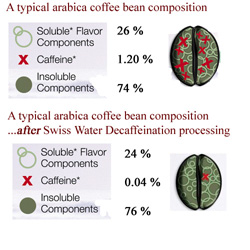Swiss Water Decaf Coffee
All of our decaf coffee has been decaffeinated
utilizing the SWISS WATER® Process. This unique process uses pure water from British Columbia, Canada to gently remove the caffeine until the coffee beans are 99.9% caffeine-free, while maintaining the bean's distinctive origin and flavor characteristics. 
The SWISS WATER® Process is a method of decaffeinating coffee beans that was developed by the Swiss Water Decaffeinated Coffee Company. To decaffeinate the coffee bean by the Swiss Water method, a batch of green (unroasted) beans is soaked in hot water, releasing caffeine. This process is done until all the caffeine and coffee solids are released into the water. These beans are then discarded.
Next, the water passes through a carbon filter which traps the caffeine molecules but allows the water and the coffee solids to pass through. The caffeine-free water which comes through, known as "flavor-charged" water by the company, is then put in a similar filtration device, and new coffee beans are added. However, since the flavor-charged water cannot remove any of the coffee solids from the new beans, only the caffeine is released.
The process repeats, filtering out all the caffeine until the beans are 99.9% caffeine free. These beans are removed and dried, and thus retain most if not all of their
flavor and smell.
Below is an explanation of the decaffeinated process that was taken directly from the Swiss Water Company.
|